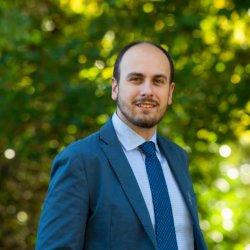Structural health monitoring of wind turbines exposed to atmospheric turbulence
Start date
1 October 2024Duration
3.5 yearsApplication deadline
Funding source
UKRI and/or University of SurreyFunding information
We are offering the UKRI standard stipend (currently £18,622 per year) with an additional bursary of £1,700 per year for full 3.5 years for exceptional candidates. In addition, a research, training and support grant of £3,000 over the project is also offered. Full home or overseas tuition fees (as applicable) will be covered.
Supervised by
About
Climate change and net-zero policies across the globe are urgently promoting the need for renewable energies [1]. In the UK alone, for every extra GWh of energy produced by wind, we can prevent the emission of 450 tonnes of carbon yearly [2].
However, as wind turbines/farms grow in size to cope with this increasing energy demand, they are ever more subject to aeroelastic loads due to their design operation and the effect of atmospheric turbulence. In this PhD, you will experimentally investigate how different thermal atmospheric states (also driven by climate change) influence the structural loads a turbine’s blade, tower and hub joints experience, ultimately influencing maintenance and life cycle of the turbine. The experimental work will be carried out in the EnFlo Laboratory – the only UK facility capable of simulating realistic thermally stratified atmospheric boundary layers [3]. The project is at the forefront of environmental aerodynamics and structural engineering and will consider methodologies for non-intrusive structural health monitoring of stationary and dynamic loads, optimal number and sensors location, and innovative data processing techniques to interpret (an predict) the measured loads.
The objectives are:
- OBJ1: Mapping the different structural loads perceived by a wind turbine (operating in isolation) due to the presence of atmospheric turbulence;
- OBJ2: Exploring optimal positioning/number/type of sensors to provide real-time structural health monitoring;
- OBJ3: Combining and extending OBJ1 and OBJ2 to arrays of wind turbines (wind farms).
The programme of work will follow the timeline and milestones below:
Year 1 – Literature review (M0-M6), Manufacturing of turbine & sensor research (M06-M8), Pilot experiment (M8-M10), Data reduction (M10-M12) – [OB1]
Year 2 – Dissemination activities/Conference (M0-M2), Refinement of pilot tests (M2-M4), First experimental campaign (M4-M6), Data reduction (M6-M10), Dissemination activities/Journal (M10-M12) – [OB2]
Year 3 – Manufacturing of additional turbines (M0-M2), Second experimental campaign (M2-M4), Data reduction (M4-M8) – Dissemination activities/thesis (M8-M12) [OB3]
References:
[1] Climate Change 2021: the Physical Science Basis. Intergov. Panel on Climate Change (IPCC). UN
[2] Digest of United Kingdom Energy Statistics (DUKES) 2019. Technical report, Office for National Statistics from Department for Business, Energy & Industrial Strategy, 2019.
[3] https://www.nwtf.ac.uk/facility/environmental-flow-enflo/
Eligibility criteria
Open to both UK and international candidates.
Up to 30% of our UKRI-funded studentships can be awarded to candidates paying international rate fees. Find out more about eligibility.
You will need to meet the minimum entry requirements for our Aerodynamic and Environmental Flow PhD programme.
We are seeking candidates with a first-class degree or a good 2:1 in a relevant engineering field (aeronautics, environmental, civil, mechanical) or physical/environmental science (physics, meteorology), with excellent communications skills. Previous experience with experimental work would be highly beneficial.
How to apply
Applications should be submitted via the Aerodynamic and Environmental Flow PhD programme page. In place of a research proposal, you should upload a document stating the title of the project that you wish to apply for and the name of the relevant supervisor.
Studentship FAQs
Read our studentship FAQs to find out more about applying and funding.
Application deadline
Contact details

Studentships at Surrey
We have a wide range of studentship opportunities available.


